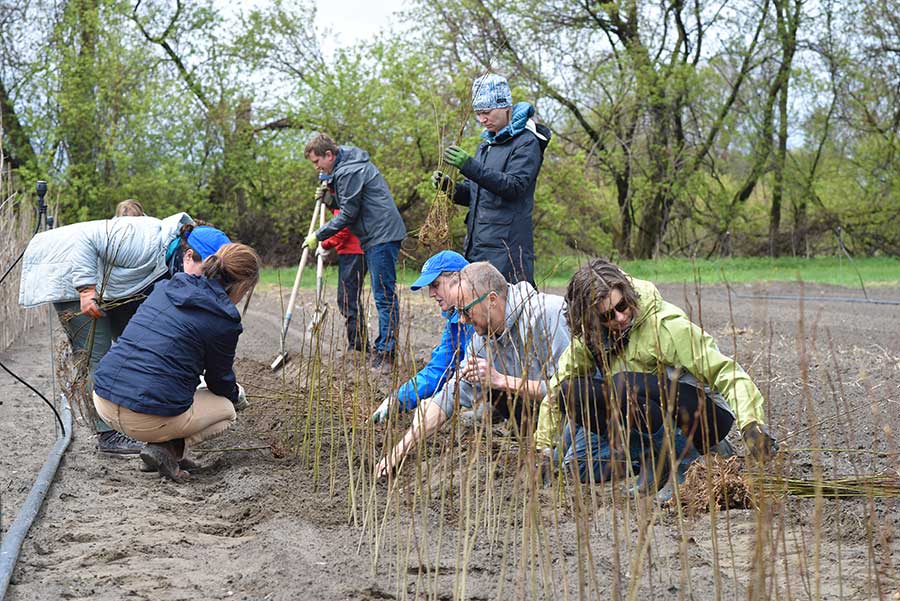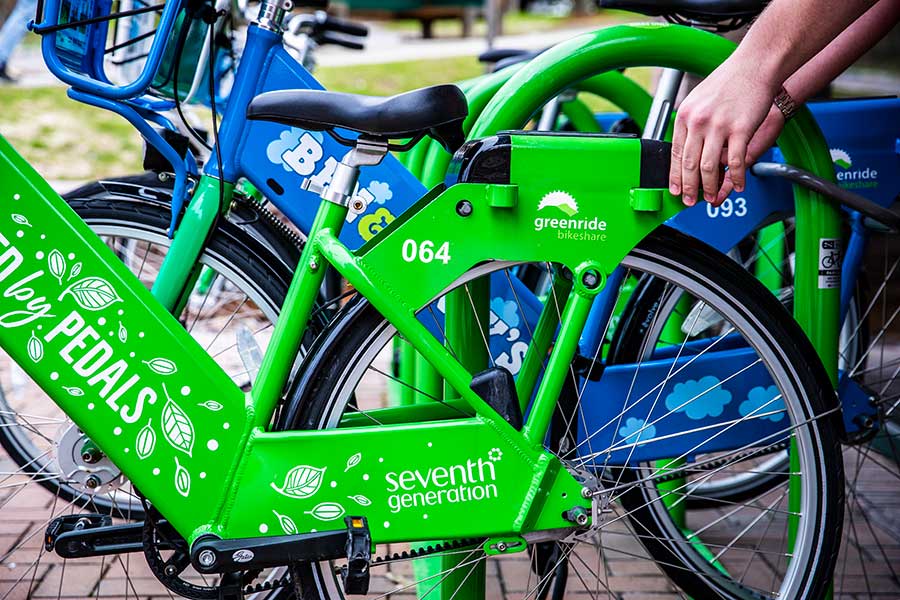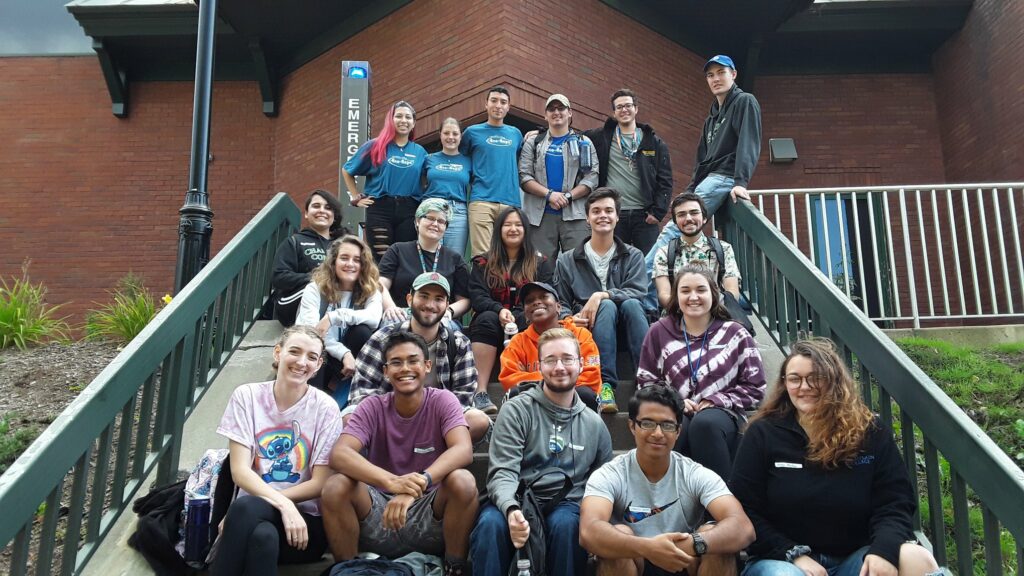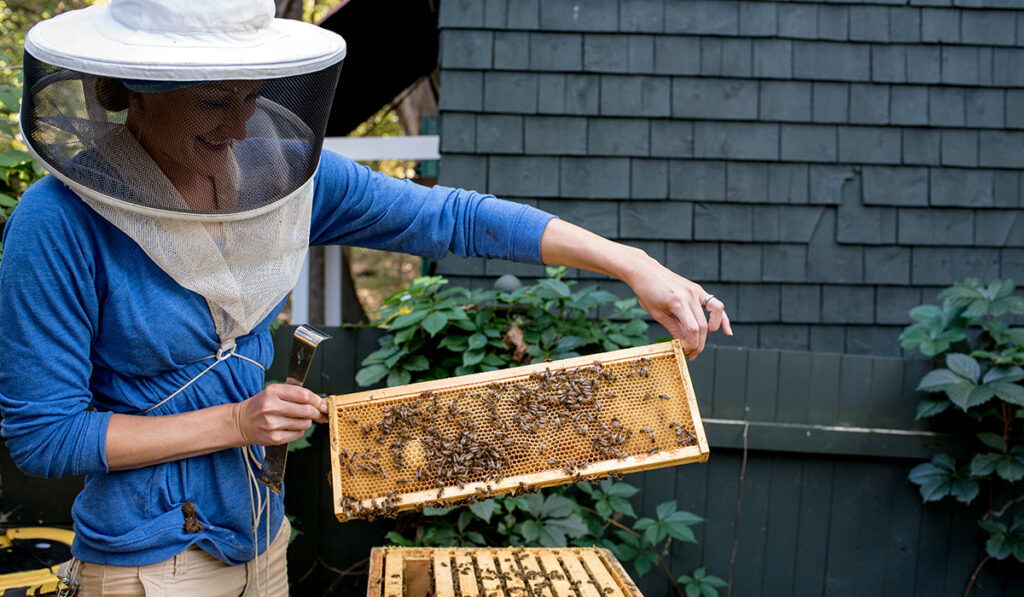Sustainability initiatives help Champlain reach its highest-ever ranking in The Princeton Review’s Guide to Green Colleges: 2019 Edition.
By 2030, Champlain’s hometown, Burlington, Vermont, has big plans to become a Net Zero Energy City, which means all buildings and ground transportation within the city will have a carbon neutral footprint. Burlington was already the first city in the country to draw 100 percent of its power from renewable sources, and now it plans to become as green as it possibly can be—a goal Champlain College shares with its hometown.
On our hilltop campus we have our very own Center for Service & Sustainability, environmentally themed student clubs, our student Eco-Reps program, and our Environmental Studies & Policy major and minor. This year alone, Champlain increased our STARS sustainability score to a silver rating, and five of our students made it on the finalists board for the national student competition, Project Green Challenge. Now, The Princeton Review has named Champlain as #25 in its Guide to Green Colleges: 2019 Edition.


“We salute—and strongly recommend—Champlain College to the many environmentally minded students who want to study and live at a green college,” said Rob Franek, The Princeton Review’s Editor-in-Chief.
To formulate their score, The Princeton Review gave Champlain points based on our sustainable policies, practices, and programs, and gathered information for their report from Dr. Christina Erickson’s recent STARS data collection. Erickson is the Learning Director of our Center for Service & Sustainability.
Colleges with a “Green Rating” score of 80 or higher made it into the 2019 edition. Current Champlain students were also surveyed on how they felt influenced by sustainability efforts on campus, how much they felt students and the administration focused on and supported environmental topics on campus, and the visibility and impact of student environmental groups on campus. Their positive responses helped place Champlain as No. 25 on The Princeton Review’s list.


“This ranking is further acknowledgement of the hard work that many people on campus have put into deepening our commitment to campus sustainability over the past decade,” says Erickson. “We’ve been included in this review since 2012, but this is the highest ranking we’ve been listed at yet.”
We salute—and strongly recommend—Champlain College to the many environmentally minded students who want to study and live at a green college.
Rob Franek, The Princeton Review
But how did Champlain become such a green-minded institution? Here are just a few of the sustainability programs and initiatives we’re most proud of.
Energy-Efficient Buildings
From our apartment-style housing at 194 Saint Paul Street, to our very own Victorian-era mansions, Champlain has many unique buildings our students call home. Over the past decade we’ve worked to make sure the buildings run on clean energy.
In 2010, our admissions building, Perry Hall, was the first Champlain building to convert to using 100 percent geothermal energy for heating and cooling. This means the building collects natural heat and gases from the earth and converts them into energy. Since that time, Juniper Hall, Valcour Hall, Butler Hall, Whiting Hall, the Center for Communications & Creative Media (CCM), and Bader Hall have been converted to geothermal. In the near future, six more buildings are projected to be converted to green energy sources.


194 St. Paul Street, an apartment-style residence hall that opened to students in 2018, is completely fitted with solar panels. Solar panels, or photovoltaic panels, absorb sunlight to create direct current electricity, making the panels an extremely green energy option. With 300 students living in the space—and each apartment equipped with compost bins and low-flow shower heads—the apartment building is one of the greenest in downtown Burlington.
Perry Hall was also recognized with the BLUE Certification in 2018 for being watershed friendly, and Aiken Hall won a LEED award from the U.S. Green Building Council. You can see all of the accolades our buildings have received here.
Champlain Bike Culture
Not only is Burlington a walkable city, but Champlain College is also a bike friendly campus. Transportation Director (and bike enthusiast) Nic Anderson has worked for the past few years to lessen Champlain’s carbon footprint in relation to vehicle-caused emissions.
Because of Anderson’s hard work, the Champlain campus is part of Vermont’s GreenRide BikeShare—a program that allows you to rent and use community bikes around the city of Burlington. Champlain students pay only $25 a year to access a bike whenever they need it. Students can visit multiple bike hubs around Burlington, including one stationed right outside of the CCM Center. We even have our own “Champ Riders Cruise” weekly ride series, during which students use the GreenRide Bikes to take a trip around Burlington together every Wednesday, encouraging exercise and green travel.


“Having access to convenient, cheap, and reliable transportation options for short-distance trips is important. GreenRide opens the door to short, one-way trips for people who just need to get places. As the system grows and more hubs are installed, the system will only get better,” says Anderson.
As a recognized Silver-Level Bike Friendly University, Champlain is proud to have such a strong campus bike culture and to reduce our transportation emissions.
Student Environmental Activism and Participation
From the classroom to club meetings, Champlain students have been the No. 1 source of environmental movement on campus.
In the classroom, students and professors across academic divisions have participated in environmentally themed year-long projects and finals. Last year in the Education & Human Studies division, Dr. Valerie Esposito’s course, Place-based Environmental Study, helped Erickson collect information on the environmental efficiency of our campus for the 2019 STARS study. Students created an analysis of our courses with environmental content, improved our campus e-waste system, and presented about fair trade to Champlain administrators.
In the Communication & Creative Media division, students in the 2019 Communication major Capstone course turned their creative minds to green issues with Program Director Dr. Cheryl Casey. For a portion of the Capstone, the students put together a comprehensive communications packet for their client, the State of Vermont, during Air Quality Awareness Week.


“It’s exciting to see the various service-learning classes that have been designed in the last two years,” says Erickson. “Some of the projects coming out of the classes are so cool.” Erickson notes that many classes in the Stiller School of Business will soon be looking to partner with local environmental organizations for capstones and class projects. The projects could range from creating business plans to performing carbon accounting.
Out of the classroom and in our residence halls are campus Eco-Reps. A program that began in 2011 through the Center for Service & Sustainability, Eco-Reps are student leaders who host sustainability-themed events that educate and empower the student community to lead more environmentally aware and active lives. The program currently has 22 students from diverse majors like Digital Forensics, Law, and Filmmaking. Every month, these students host presentations and activities for their peers about topics like air quality, compost and recycling sorting, and water conservation. This past October, the Eco-Reps participated in a turtle habitat clean-up on our very own Lake Champlain, an event organized by the Vermont Fish & Wildlife Department, and tabled in the IDX Student Life Center to raise awareness about fair trade.
Senior Filmmaking major and co-captain of the Eco-Reps, Hansel Carter, says the Eco-Reps crew is a perfect place for any student on the Champlain campus who is looking to get environmentally involved.


“It’s a really great opportunity to blend your passion for the environment with your personal skills, and bond with a team that has similar interests, but diverse backgrounds and experiences,” says Carter. He encourages any and all Champlain students to sign up to be Eco-Reps, or attend as many Eco-Rep events as they can.
In addition to student-formed clubs and projects, we have long-standing faculty- and student-run programs, including the Champlain Community Garden and the Champlain Apiary. In the garden, dozens of faculty and students grow their own fruits and vegetables, reducing food transportation emissions and connecting them to the land. At the apiary—headed by professor and Apiary Director Dr. Kristin Wolf and her team of student workers—Champlain bees pollinate Burlington flowers and make their own honey. The honey and garden give students and faculty fantastic options for locally grown, sustainable food.


Senior Professional Writing major Margot Nelson participated in both programs during her time at Champlain.
“I was so glad that Champlain provided me with the chance to grow and tend my first-ever vegetable garden this summer. It was a great experience, and I loved learning more about growing my own food,” says Nelson. “The Champlain Apiary welcomes students from the local public schools to learn more about bees, local ecosystems, and sustainability. It’s an incredible resource, and I’m so glad we get to share it with the community.”
These current programs are just the tip of the iceberg for Champlain. With these and many more to come, Champlain looks forward to reducing our footprint even further, and making our community as green as it can be.